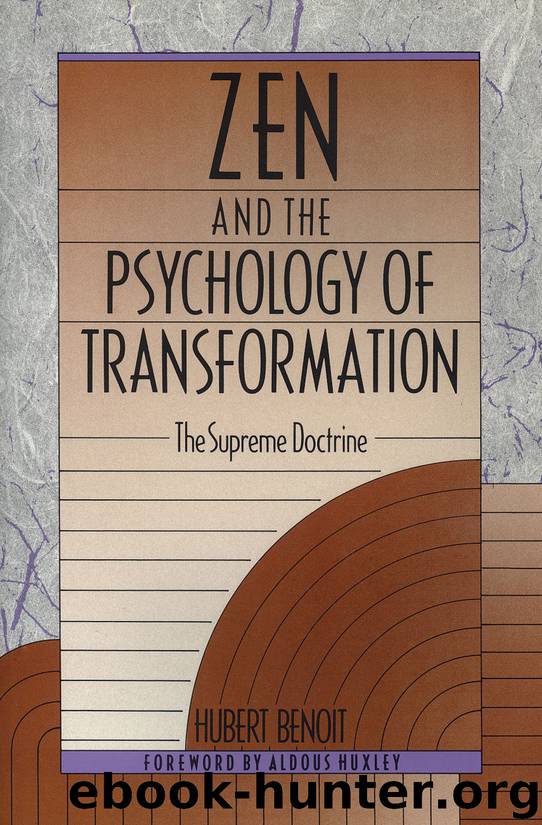Zen and the Psychology of Transformation by Hubert Benoit

Author:Hubert Benoit [Benoit, Hubert]
Language: eng
Format: epub
Publisher: Microsoft
Published: 0101-01-01T00:00:00+00:00
Chapter Fifteen
SENSATION AND SENTIMENT
AT each given moment of emotion there exists a relation, as we have said, between the images which pass across our mind and our sub-jacent emotivity. This relation is complex; it is interesting to study because it comprises certain very subtle traps which prevent us from paying attention to our emotivity.
It is important first of all to recall the essential distinction which exists between the imaginative film founded on the real present and the imaginative film invented in the mind. When I observe any spectacle in the outer world I observe it by means of an imaginative film which partially reproduces the spectacle outside, a film founded on the outer forms that my attention has seized. When I day-dream, in idleness or in the course of any activity, I perceive an imaginative film invented in my mind. Emotivity is connected in very different ways to these two kinds of films. We will study these two cases, using the following terms: the film founded on the outer world we will call the 'real imaginative film' (since it is founded on phenomena which, if they lack absolute reality, have, nevertheless a relative reality); the invented film we will call the 'imaginary film'.
When it is a question of a real imaginative film the relation which exists between this film and emotivity is simple enough: the emotivity varies (quantitative variations of contraction-decontraction) according to the character, affirming or negating, of the images of the film: the images associated with a menace to my existence determine the emotive contraction, those associated with the continuation of my existence determine the diminution of this contraction, that is a relative relaxation. This reaction of the emotivity to the images of the real film constitutes a one-way relation: the form of the imaginative phenomena determines the form of the emotive phenomena. From the point of view of form the outside world is active and my inner world is passive. Nothing is motionless; the exterior phenomena change unceasingly, and the reacting emotivity varies unceasingly. There is no motionless emotivity; there are only contractions, no spasm; there is no emotive state, but only emotions.
When it is a question of an imaginary film everything is much more complicated. The relation with emotivity is no longer one-way, it exists in both directions at once. It exists first of all as it existed in the preceding case; the emotivity reacts to the imaginary images as it reacted to the real images (emotivity does not differentiate between these two kinds of images; a jealous man who vigorously imagines a scene in which his wife deceives him is as if the scene were real). But on the other hand the emotive state reacts to the elaboration of the imaginary film; if a real misfortune befalls me and saddens me I start imagining a thousand other misfortunes and I see everything in the same sombre light. Thus there is established a vicious circle of double reactions.
But, in this relation between emotivity and imaginary film, another more important factor intervenes.
Download
This site does not store any files on its server. We only index and link to content provided by other sites. Please contact the content providers to delete copyright contents if any and email us, we'll remove relevant links or contents immediately.
The Way of Zen by Alan W. Watts(6600)
Ego Is the Enemy by Ryan Holiday(5413)
The Art of Happiness by The Dalai Lama(4125)
The Book of Joy by Dalai Lama(3972)
Why Buddhism is True by Robert Wright(3446)
Spark Joy by Marie Kondo(3298)
Shift into Freedom by Loch Kelly(3192)
Happiness by Matthieu Ricard(3040)
A Monk's Guide to a Clean House and Mind by Shoukei Matsumoto(2902)
The Lost Art of Good Conversation by Sakyong Mipham(2641)
The Meaning of the Library by unknow(2564)
The Unfettered Mind: Writings from a Zen Master to a Master Swordsman by Takuan Soho(2302)
The Third Eye by T. Lobsang Rampa(2257)
Anthology by T J(2206)
Red Shambhala by Andrei Znamenski(2193)
The Diamond Cutter by Geshe Michael Roach(2058)
Thoughts Without A Thinker: Psychotherapy from a Buddhist Perspective by Epstein Mark(2011)
Twilight of Idols and Anti-Christ by Friedrich Nietzsche(1889)
Advice Not Given by Mark Epstein(1878)
